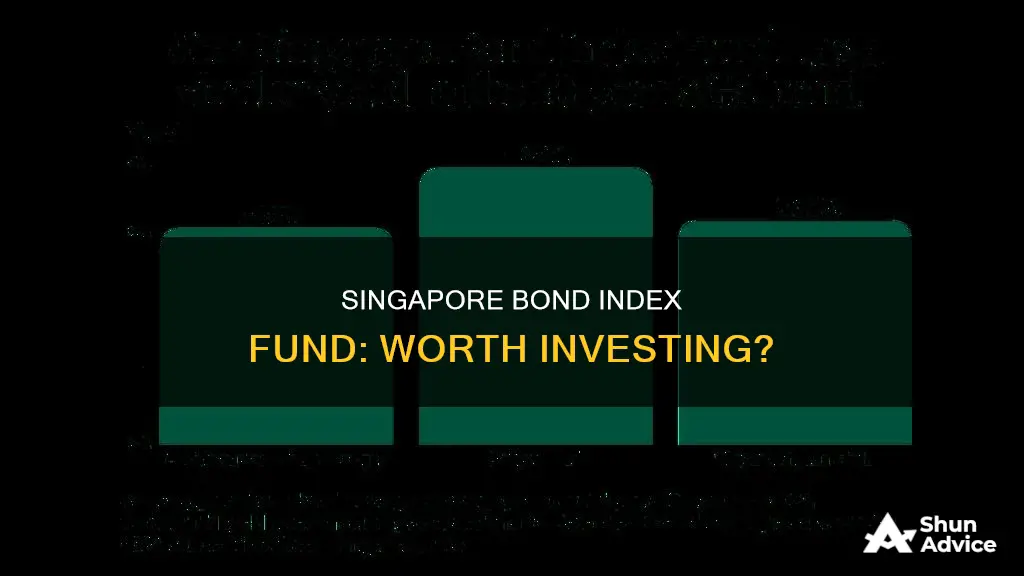
The ABF Singapore Bond Index Fund is an exchange-traded fund (ETF) that offers a safe investment with AAA and Aaa ratings. It is suitable for conservative investors who are not willing to put their money at great risk in exchange for smaller returns, equity investors who want to rebalance their portfolios to reduce risk and desire more steady income, and beginner investors who want to build a portfolio gradually. The fund has a history of providing stable and reliable income, helping to cushion the volatility of stocks, and ease the pain of a bear market. It is classified as a low-risk product because it invests largely in sovereign and quasi-sovereign bonds issued or guaranteed by the government of Singapore or other Asian governments.
What You'll Learn

Returns and risks
Returns
The ABF Singapore Bond ETF has achieved an average return of about 2.79% per year since its inception in 2005. This return beats most Singapore fixed deposit rates and the CPF Ordinary Account's 2.5% p.a. interest. The fund aims to provide returns higher than SGD risk-free rates in the mid-to-long term.
Risks
The ABF Singapore Bond Index Fund is considered a relatively low-risk product, investing primarily in sovereign and quasi-sovereign bonds issued or guaranteed by the government of Singapore or other Asian governments. These bonds have the highest credit ratings of AAA, Aaa, and AAA from Standard & Poor's, Moody's, and Fitch, respectively.
However, there are still some risks associated with investing in the fund:
- Interest rate risk: Bond prices are sensitive to interest rate changes. Higher interest rates may result in lower bond prices, leading to potential losses for bond investors.
- Tracking error: The fund may not closely replicate the index it tracks, resulting in deviations in performance.
- Credit rating downgrade: A downgrade in the credit rating of any of the bonds held by the fund may result in lower bond prices and potential losses.
- Borrower's rating risk: A rating downgrade of a borrower increases the cost of interest payments, leading to a decrease in bond prices.
- Volatility: While bonds are generally less volatile than stocks, there is still a potential for loss when investing in bonds.
Overall, the ABF Singapore Bond Index Fund offers a relatively low-risk investment option for those seeking steady returns. However, it is important to carefully consider the potential risks and consult a financial advisor before making any investment decisions.
Fidelity Proof of Funds: Accessing Investment Account Verification
You may want to see also

Who is the fund for?
The ABF Singapore Bond Index Fund is suitable for three types of investors: the cautious investor, the equity investor, and the beginner investor.
The Cautious Investor
If you are risk-averse but still want to grow your money, bond investments are a good option. While expected returns may be slightly lower, you can rest easy knowing your investment capital is safer than it would be in the stock market. Bonds are generally deemed safer than stocks because of their lower volatility, the legal obligation to pay interests and repay principal at maturity, and their higher claim hierarchy than shareholders in the event of liquidation. The ABF Singapore Bond Index Fund is classified as a low-risk product because it invests mainly in sovereign and quasi-sovereign bonds issued or guaranteed by the government of Singapore or other Asian governments.
The Equity Investor
If you have a large exposure to stocks and want to lower your risk, adding bonds to your portfolio can help. Modern Portfolio Theory states that diversification across asset classes can lead to higher returns and lower risks. The ABF Singapore Bond Index Fund tends to be negatively correlated with stocks, making it a good hedge against stock market corrections and crashes. For example, during the Covid-19 crash, when stock prices went down, bond prices went up.
The Beginner Investor
If you have little capital but want to start investing, the ABF Singapore Bond Index Fund offers a low-risk option with affordable investment amounts. The lot size for the fund has been reduced to just 10 units per lot, making the minimum investment very accessible. For example, if the fund is trading at $1, the minimum investment is only $10. However, it is important to consider transaction fees, as broker fees can eat into your returns if you are only investing small amounts. Regular investment plans, such as POSB's plan, can help you invest small amounts regularly with low fees.
Selecting the Right Investment Fund for Your HSA
You may want to see also

How to purchase
There are two main ways to purchase the ABF Singapore Bond Index Fund: a lump-sum investment or a regular savings plan.
Lump-Sum Investment
If you have a sum of money available and want to make a mid-to-long-term investment, you can purchase the ABF Singapore Bond Index Fund as a lump-sum investment. However, it is important to carefully consider the pricing and timing of your investment. Consulting a financial advisor can help you make a more informed decision.
Regular Savings Plan
You can also set up a regular savings plan with financial institutions, such as banks, insurance companies, or stockbrokers. This allows you to invest smaller amounts of money at regular intervals, such as monthly or quarterly. By using the dollar-cost averaging technique, you can reduce your overall purchasing costs.
The idea behind dollar-cost averaging is that by investing a fixed amount at regular intervals, you effectively lower your average cost per unit over time. This strategy can be advantageous when the market is volatile, as it allows you to purchase more units when prices are low and fewer units when prices are high.
Other Considerations
When purchasing the ABF Singapore Bond Index Fund, it is important to keep in mind that it is classified as an "Excluded Investment Product" (EIP) in Singapore. This means that general investors can easily understand the fund's information and invest without needing to pass the "Customer Knowledge Assessment" (CKA). Additionally, the fund is included in the Singapore Central Provident Fund Board's "Ordinary Account" and is classified as a narrow-to-medium-risk investment.
Brokerage Options
When considering which brokerage to use, you may want to look into options like POEMS, DBS, POSB, or other participating dealers listed on the Nikko AM website. These institutions can facilitate your investment in the ABF Singapore Bond Index Fund through various plans and offerings.
Minimum Investment
It is important to note that while the lot size for the ABF Singapore Bond Index Fund is 10 units per lot, investing a very small amount each time may result in substantial costs due to brokerage fees. Thus, it is generally recommended to keep transaction fees below 1% of the investment amount.
Regular Investment Plans
If you are looking to invest small amounts regularly, you can consider POSB's regular investment plan, which charges only 0.5% for investments as low as S$50 per month. This makes it a highly affordable option for those just starting their investment journey.
Setting Up a Property Investment Fund: A Comprehensive Guide
You may want to see also

How does it compare with other index funds?
The ABF Singapore Bond Index Fund is a good option for investors who want to play it safe. It is a low-risk product that invests in sovereign and quasi-sovereign bonds issued or guaranteed by the government of Singapore or other Asian governments. The fund has a history of steady and slow gains, making it ideal for cautious investors.
When compared to other index funds in Singapore, the ABF Singapore Bond Index Fund stands out for its focus on government-related bonds. It specialises in the Singapore Government Bonds market and invests in high-quality bonds with the highest sovereign rating of AAA. This makes it a conservative investment choice for those who prefer stability over high growth.
In terms of returns, the ABF Singapore Bond Index Fund has delivered approximately 55% or 2.79% per year since its inception in 2005. While this may be lower than what other investment tools offer, it is still higher than most Singapore fixed deposit rates and the CPF Ordinary Account's interest rate. The fund also has a low expense ratio of 0.26% per annum, which includes management fees.
Compared to other bond funds, such as the Singapore Savings Bonds (SSB), the ABF Singapore Bond Index Fund offers higher returns. However, SSB provides capital protection with returns guaranteed by the Singapore government. The ABF Bond Index Fund, on the other hand, consists mostly of AAA-rated Singapore government bonds but also includes lower-rated bonds, making it slightly less secure.
When compared to Treasury Bills (T-bills), the ABF Singapore Bond Index Fund offers a higher yield. However, it is important to note that T-bill yields are currently higher due to the inverted yield curve, and this may not always be the case. T-bills also require more active management, as investors need to build their own bond ladder and frequently rotate their money.
Overall, the ABF Singapore Bond Index Fund is a good choice for investors seeking a conservative, low-risk investment option with steady returns. It is ideal for those who prefer the stability of government-related bonds and are willing to accept slightly lower returns compared to more aggressive investment options.
Equity Funds: A Guide to Investing and Growing Your Wealth
You may want to see also

Historical performance
The ABF Singapore Bond Index Fund was one of the earliest Exchange-Traded Funds (ETFs) listed on the Singapore Exchange (SGX). Since its inception on 31 August 2005, the ETF has grown significantly and had Assets Under Management (AUM) of S$983 million as of 31 March 2021.
Over 16 years, the ABF Singapore Bond ETF has gained about 55% or 2.79% per year. This return would have beaten most Singapore fixed deposit rates and the CPF Ordinary Account's 2.5% p.a. interest, all while maintaining its investments in AAA-rated bonds.
The fund is a solid risk-resistant performer during market crises as its assets are low-risk government and semi-government bonds with the highest ratings. The fund's performance during various crises is as follows:
- 2001 Dot-Com Bust; 911 Crash
- 2008 Global Financial Crisis
- 2011 Europe Debt Crisis
- 2015-2016 Market Selloff
- 2020 COVID-19 Pandemic Selloff
The fund aims to achieve returns higher than SGD risk-free rates in the mid-to-long term.
Cash in Mutual Funds: A Safe Investment Strategy?
You may want to see also
Frequently asked questions
The ABF Singapore Bond Index Fund is the first exchange-traded fund (ETF) in Singapore. It was launched on 31 August 2005 and has grown significantly since then, with Assets Under Management (AUM) of S$983 million as of March 2021. The fund seeks to provide investors with returns by investing in high-quality bonds, such as Singapore Government or Government-linked bonds.
The fund is suitable for conservative investors who are not willing to put their money at great risk and prefer stable, low-risk investments. It is also a good option for equity investors looking to rebalance their portfolios and reduce risk, as well as beginner investors who want to build a diversified portfolio gradually.
There are several risks to consider before investing in the fund, including interest rate risk, tracking error risk, and credit rating downgrade risk. Bond prices are sensitive to interest rate changes, and a rating downgrade of a borrower can impact bond prices. Additionally, the fund may not always be able to replicate the index it is tracking, which can lead to deviations in performance.







